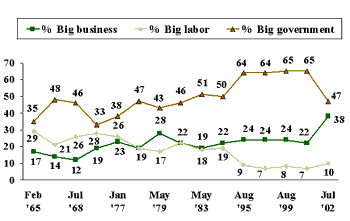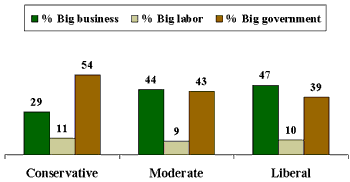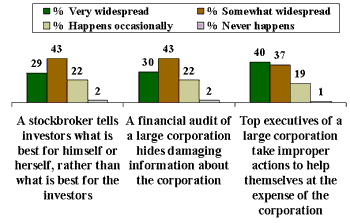GALLUP NEWS SERVICE
PRINCETON, NJ -- The recent wave of corporate scandals has taken a toll on how Americans perceive big business. Results of the latest CNN/USA Today/Gallup poll show that substantial numbers of Americans believe that unethical practices are fairly widespread in the business world. Additionally, the poll reveals a sharp increase in the percentage who view big business as more of a threat to the nation than big labor or big government. Nevertheless, the greatest number of Americans still sees big government as the most threatening of the three, continuing a trend dating back to 1965.
The poll, conducted July 5-8, asked Americans which they view as "the biggest threat to the country in the future -- big business, big labor or big government." Thirty-eight percent say big business is the biggest threat, up sharply from 22% when the question was last asked in October 2000, and the highest it has been since the question was first asked in 1965. Despite the increase, the greatest percentage of Americans, 47%, still views big government as a bigger threat. The percent saying government is the biggest threat is the lowest it has been since 1981, and down significantly from 65% in October 2000. Only 10% say big labor is the biggest threat, which reached as high as 29% in 1965.
| Biggest Threat to the Country: Big Business, Big Labor, or Big Government? |
 |
The fact that more Americans persist in seeing the government as the biggest threat facing the country underscores the difficulties the president and Congress have as they wrestle with the idea of new laws and government regulation to help control big business abuses.
Younger Americans are more likely to see big government as the more serious threat while older Americans tend to view big business as the larger threat. Among Americans under the age of 50, a majority, 52%, view big government as the greater threat while 33% say this about big business. However, a plurality (46%) of those aged 50 and older see big business as the greater threat while 39% of those in this age group say big government is the greater threat.
While, somewhat surprisingly, there are no differences according to party affiliation, the expected differences are evident according to political ideology. Fifty-four percent of conservatives say big government is the greater threat while just 29% of conservatives choose big business as the bigger threat. Among liberals, a plurality, 47%, say big business is the greater threat while 39% say big government is the more serious threat. Moderates are evenly divided as to whether big business (44%) or big government (43%) is the greater threat.
| Biggest Threat to the Country: Big Business, Big Labor, or Big Government? By Political Ideology |
 |
| July 5-8, 2002 |
The data reinforce other recent Gallup findings that show declining perceptions of big business. Gallup's recent update on confidence in institutions showed that confidence in big business -- never very high to begin with -- dropped eight percentage points from last year to 20%, matching a low set in 1981.
Public Believes Unethical Business Practices Fairly Common
Earlier this week, President Bush and members of Congress began work on legislation to improve corporate responsibility. According to the poll, Americans believe that the types of corporate misdeeds that have made news this year are common in the business world. Specifically, more than seven in 10 Americans believe that each of the following problems is at least somewhat widespread:
- Top executives at large corporations taking improper actions to help themselves at the expense of the company
- Financial audits of large corporations hiding damaging information about the company
- Stockbrokers telling investors what is in his or her own interests, rather than what is best for the investors
| Unethical Business Practices: How Widespread? |
 |
| July 5-8, 2002 |
It should be noted, though, that despite the belief that these problems are widespread, recent Gallup polling suggests that Americans are not clamoring for new business regulations. The current poll shows Americans are divided as to whether the solution is to require tougher standards for large corporations (50%) or to get rid of business executives who break the law (48%). A June 28-30 Gallup poll showed that many more Americans favored stricter enforcement of existing laws that regulate corporations (69%) than the establishment of new laws (27%), and Americans are nearly evenly divided as to whether government currently regulates business and industry "too much" (32%), "too little" (33%), or "the right amount" (30%).
Survey Methods
These results are based on telephone interviews with a randomly selected national sample of 1,013 adults, aged 18 and older, conducted July 5-8, 2002. For results based on this sample, one can say with 95% confidence that the maximum error attributable to sampling and other random effects is ±3 percentage points. In addition to sampling error, question wording and practical difficulties in conducting surveys can introduce error or bias into the findings of public opinion polls.
In your opinion which of the following will be the biggest threat to the country in the future -- big business, big labor, or big government?
|
Big |
Big |
Big |
No |
|
|
% |
% |
% |
% |
|
|
2002 Jul 5-8 |
38 |
10 |
47 |
5 |
|
2000 Oct 25-28 |
22 |
7 |
65 |
6 |
|
1999 Aug 24-26 |
24 |
8 |
65 |
3 |
|
1998 Dec 4-6 |
24 |
7 |
64 |
5 |
|
1995 Aug 11-14 |
24 |
9 |
64 |
3 |
|
1985 Jun 7-10 |
22 |
19 |
50 |
9 |
|
1983 May 13-16 |
19 |
18 |
51 |
12 |
|
1981 Sep 18-21 |
22 |
22 |
46 |
10 |
|
1979 May 4-7 |
28 |
17 |
43 |
12 |
|
1978 Sep 15-18 |
19 |
19 |
47 |
15 |
|
1977 Jan 7-10 |
23 |
26 |
38 |
13 |
|
1969 Nov 12-17 |
19 |
28 |
33 |
20 |
|
1968 Jul 18-23 |
12 |
26 |
46 |
16 |
|
1966 Dec 8-13 |
14 |
21 |
48 |
17 |
|
1965 Feb |
17 |
29 |
35 |
19 |
Next, I am going to ask you about some activities that might occur in the business world. Would you say that each of the following activities -- is very widespread, is somewhat widespread, only happens occasionally, or never happens? How about -- [RANDOM ORDER]?
A. A stockbroker tells investors what is best for himself or herself, rather than what is best for the investors
|
Very widespread |
Somewhat widespread |
Happens occasionally |
Never |
No |
|
|
2002 Jul 5-8 |
29% |
43 |
22 |
2 |
4 |
B. A financial audit of a large corporation hides damaging information about the corporation
|
Very widespread |
Somewhat widespread |
Happens occasionally |
Never |
No |
|
|
2002 Jul 5-8 |
30% |
43 |
22 |
2 |
3 |
C. Top executives of a large corporation take improper actions to help themselves at the expense of the corporation
|
Very widespread |
Somewhat widespread |
Happens occasionally |
Never |
No |
|
|
2002 Jul 5-8 |
40% |
37 |
19 |
1 |
3 |
